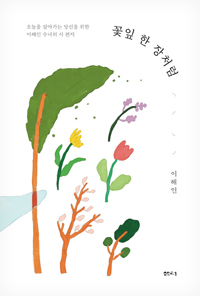The other day, when I tried to apply spiritual exercises during the parish book fair, one priest suggested making a program that can be a guide to help people speak well, more in a positive way.
He was mindful of lingering words spoken in a negative and critical way. In
many ways, the negative way of speaking gives us deep influence both in the
conscious and in the unconscious.
Since then, I have been interested in good passages regarding words and
expressions.
While reading “Like a Petal,” the recent collection of poems and poetry letters
written by Sr. Lee Hae-in celebrating the 54th anniversary of the first
profession this year, I pondered on some passages on the use of the words.
Among the poems in “Like a Petal,” “The words we speak every day” inspired me:
May the
words we speak every day
leave a fragrant afterglow
with fragrant words,
not with disgusting smells.
May all our words become
flowers of joy and songs of peace
in the hearts of our neighbors
so that the world becomes a little brighter.
Let us speak pure words
with a pure heart
that does not spread gossip
and false rumors that will not help anyone.
Let me speak words of love
with a heart of love
that understands before me
the other person’s point of view.
Help me to say positive things
with a positive mind
that sees the good things first
rather than the bad things of others.
Help us refine our language
with the clear water of wisdom
drawn from the fountains of silence and prayer,
just as we cultivate a single orchid
by watering it with all sincerity every day.
Let the mellow fragrance of humility permeate into it.
Sr. Lee Hae-in was born in Yanggu County, Gangwon Province, in 1945 and entered
the Olivetan Benedictine Sisters of Busan at the age of 20. She chose her
religious name, Claudia, with her ardent longing to live like white clouds and
like the broadminded and merciful heart of the sea.
While fighting cancer, she lives each moment as if it is the last moment. In
the following poem entitled, “How trees love,” we can see that the best ways to
convey a positive response are silence, listening and endurance.
How trees
love
I keep
wanting
to lean closer to one another,
but we need to keep our distance
so we can see well.
When I am good at silence,
I come up with something to say.
Listening,
listening to others
is the way of love.
Waiting in silence
is the discovery of wisdom.
The completion of the prayer
is to endure and endure
without crying easily
even when I am sick or sad.
There are times when it is difficult
to stay centered throughout the four seasons,
but I still live a happy life
thanks to the roots that descend deep
into the ground as time goes by,
the stems that extend to the sky,
and the leaves that dance in the wind.
Please watch me
with love
as I give and receive love.
Thank you always.
|
“A good man out of the good treasure of his heart brings forth that which is good: and an evil man out of the evil treasure brings forth that which is evil. For out of the abundance of the heart the mouth speaks.” (Luke 6:45)
https://www.koreatimes.co.kr/www/nation/2022/08/162_334787.html
The Korea Times/ Thoughts of the Times/ August 23 (online), 24 (offline), 2022
날마다 우리가 하는 말
어느 날, 본당 도서 선교를 하면서 영적 피정을 적용하려고 했을 때, 한 신부님이, 사람들이 더 긍정적으로 말을 잘할 수 있도록 가이드가
될 수 있는 프로그램을 만들 것을 제안하셨다.
그 신부님은 부정적이고 비판적으로 하는 말이 마음속에 오래 남아 있는 것에 대해 깨어 있었다. 여러 면에서 부정적으로 말하는 것은 의식은 물론 무의식에 깊은 영향을 준다.
그때부터 나는 말과 표현에 대한 좋은 구절에 관심을 갖게 되었다.
올해 첫 서원 54주년을 맞이하시는 이해인 수녀님이 최근에 쓴 시 편지 모음인 「꽃잎 한 장처럼」을 읽으면서 나는 말의 사용에 대한 대목에 곰곰이 머물렀다.
「꽃잎 한 장처럼」에 소개된 시 가운데 “매일 우리가 하는 말은”이라는 시가 영감을 주었다.
매일 우리가 하는 말은
역겨운 냄새가 아닌
향기로운 말로
향기로운 여운을 남기게 하소서
우리의 모든 말들이
이웃의 가슴에 꽂히는
기쁨의 꽃이 되고, 평화의 노래가 되어
세상이 조금씩 더 밝아지게 하소서
누구에게도 도움이 될 리 없는
험담과 헛된 소문을 실어 나르지 않는
깨끗한 마음으로
깨끗한 말을 하게 하소서
나보다 먼저
상대방의 입장을 헤아리는
사랑의 마음으로
사랑의 말을 하게 하시고
남의 나쁜 점보다는
좋은 점을 먼저 보는
긍정적인 마음으로
긍정적인 말을 하게 하소서
매일 정성껏 물을 주어
한 포기의 난초를 가꾸듯
침묵과 기도의 샘에서 길어 올린
지혜의 맑은 물로
우리의 말씨를 가다듬게 하소서
겸손의 그윽한 향기 그 안에 스며들게 하소서
이해인
수녀님은 1945년 강원도 양구에서 태어났고, 스무 살에
부산 올리베따노 성 베네딕도 수녀회에 입회했으며, 흰 구름처럼, 넓고
어진 바다 마음처럼 살고 싶은 간절한 열망으로 ‘클라우디아’를
수도명으로 선택했다.
수녀님은 암과 투병하면서 순간순간이 마치 마지막 순간인 듯 살아간다. “나무의 사랑법”이라는 시에서 우리는 긍정적으로 반응하는 가장 좋은 방법은 침묵과 경청과 인내라는 것을 알 수 있다.
나무의 사랑법
자꾸만 가까이
기대고 싶어 하지만
서로의 거리를 두어야
잘 보이고
침묵을 잘해야
할 말이 떠오릅니다
남의 말을
듣고 또 듣는 것이
사랑의 방법입니다
침묵 속에 기다리는 것이
지혜의 발견입니다
아파도 슬퍼도
쉽게 울지 않고
견디고 또 견디는 것이
기도의 완성입니다
사계절 내내 중심 잡고
서 있기 힘들 때도 많지만
그래도 기쁘게 사는 것은
흐르는 세월 속에
땅 깊이 내려가는 뿌리
하늘로 뻗어가는 줄기
바람에 춤추는 잎사귀들
덕분입니다
오늘도 사랑받고
사랑하는 저를
사랑으로 지켜봐주십시오
늘 고맙습니다
“선한 사람은
마음의 선한 곳간에서 선한 것을 내놓고, 악한 자는 악한 곳간에서 악한 것을 내놓는다. 마음에서 넘치는 것을 입으로 말하는 법이다.”(루카 6,45)

날마다 수녀님의 글을 맛있게 잘 읽고 있음
ReplyDelete